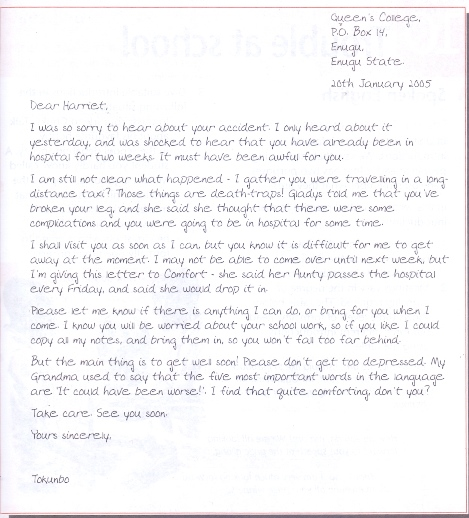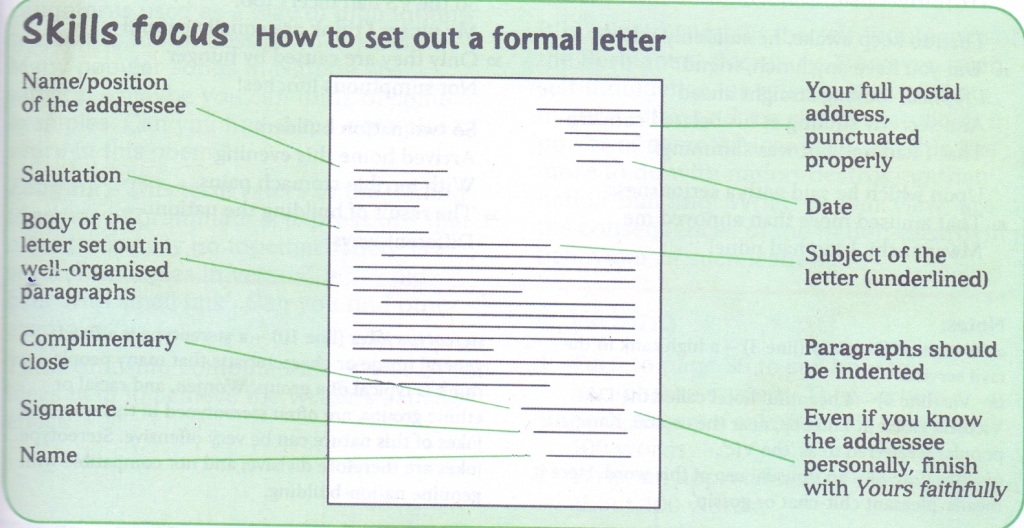The purpose of this lesson is to differentiate between Formal and Informal letter. There are some significant differences between formal and informal letter that should not be overlooked. Many students do not really know these differences. Here is an opportunity for you to learn, know and understand these differences.
Differences between Formal and Informal Letter
1. Purpose: As I mentioned earlier, the purposes of these letters are quite different. Formal letter is usually written for official reasons. A formal letter, also known as a business letter, and it is written in a formal language with a specific structure and layout.
To
- Make a complaint
- Request something
- Make an inquiry
- Apply for a Job
- Proposal
- Reference
- Invitation to speak
An informal letter is a personal letter, you may want to ask for something, or communicate with a friend far away. An informal letter is a letter you would write to a friend, a family member or an acquaintance.
2. Format: When writing a formal letter, you must be conscious of the arrangement from the addresses and dates; to the salutation and heading; down to the introduction; body and conclusion; and then closing and signature. An informal letter is quite different because you can choose to write it the way you want. You only need to follow some simple rules especially if you’re writing an informal letter during an examination. If not for exams, an informal letter is just a written form of communication without formalities.
3. Language: In informal letter, you are allowed to use codes, slang, abbreviation if you like. Formal letter is different because you have to mind your language usage.
4. Manner: You have to go straight to the point when writing a formal letter, keep it simple and short and also avoid all unnecessary friendly chat and casualness. An informal letter allows you to greet and gist a little before going to the issue at hand depending on your relationship with the recipient.
Related Article: Summary of the 3 Types of Letters
Formal Letter
Informal Letter Sample
[fusion_builder_container hundred_percent=”yes” overflow=”visible”][fusion_builder_row][fusion_builder_column type=”1_1″ background_position=”left top” background_color=”” border_size=”” border_color=”” border_style=”solid” spacing=”yes” background_image=”” background_repeat=”no-repeat” padding=”” margin_top=”0px” margin_bottom=”0px” class=”” id=”” animation_type=”” animation_speed=”0.3″ animation_direction=”left” hide_on_mobile=”no” center_content=”no” min_height=”none”]
Formal Letter Summary
Features of a Formal Letter
Your Address and date: This should be written at the top right corner.
Recipient Address: This is the address of the receiver of the letter, it should be written at the left hand side after the date.
Salutation: Dear Sir/Ma
Heading: This carries the reason you are writing the letter in one sentence, it should be in capital letters, if not, it should be underlined.
Body: First paragraph should be introductory while the second paragraph should convey whatever it is you want to get across, in details. The last paragraph should be conclusive.
Signature: This should be written at the left side after the conclusion with your names.
Note: When writing formal letters, you are not allowed to write in abbreviations or words like, don’t, shouldn’t or aren’t.
Informal Letter Summary
Features of an Informal letter
1. Address and Date
The address and date should be written at the top right corner. If the letter is going to be sent to someone in another country, you should add your country to the address.
Example
Mayflower Secondary School,
P.O Box 23546,
Ikenne,
Ogun State,
Nigeria.
7th Apr 2015.
2. Salutation
The salutation is written at the left hand side following the address and date, the most common salutation in informal letter is “Dear _____”. However, you are allowed to salute your recipient as you feel like depending on how close you are to the him/her. For instance you may want to use “Hey” or “Hi” when writing to your friend but you may not like to use that when writing to your father.
Also Read: Grammar Clinic: Letter Writing (Formal Letter)
3. Body
The first paragraph generally expresses a greeting, followed by wishes of good health. Remember you are writing to someone you know very well, so try to be as friendly as possible:
How are you my dear sister?
The second paragraph carries the reason you’re writing the letter
Try to be as conversational as possible. You are allowed to use colloquial language – i.e. language that is appropriate for speech but not really for writing:
My journey back here was fine, though it was quite a long one. I wanted to travel by BRT bus but guess what; all the wretched buses were full! So I had no choice but to travel by a small car. The journey took seven hours. By the time we arrived, my legs were tried and my bottom was severely sore, ugh! Next time, I promise, I’m not gonna use one of those tiny buses!
4. Complimentary Close
This is written at the left hand side. In informal letter writing, the complimentary close is always very friendly:
Love,
Lots of love,
Best wishes,
Missing you lots,
Yours forever, etc
Remember, a comma must follow the complimentary close.
Also Read: Grammar Clinic: Letter Writing (Informal Letter)
[/fusion_builder_column][/fusion_builder_row][/fusion_builder_container]




20 thoughts on “Grammar Clinic: The REAL Difference Between Formal And Informal Letter”
Thank you for your assistance.
i like that.
I was very glad to thisssssssssssssssssssssssssssssssssssssssssssssssssssssssssssssssssssssssssss
This blog is very educative for young people
Cool
It makes sense. More power to your elbow. Thanks.
I love this so much because is meaningful. Keep it up! and i love that.
Helped me today been d 11th of may 2016
Thanks for the highlight, it really helped. God bless you.
It’sreally educaticating,God bless for d enlightenment! but more differences are required atleast 10.more grease to ur elbows
Please my question is,in formal letter is the signature suppose not to be in end right hand side of the paper? All the same its so educating.
Anugwom lizzy. Iam a teacher with passion
Thank you very much for this very topic discussed.It is very educating and it enlightened me more. God bless you
God bless you, may your passion take you to greater heights!
I love this kind of educative blog,,, it teaches the young so that they can learn fast
Excellent
Excellent
i really like this,
this great maa…tnx
Comment…wow thats splendid
Nice one